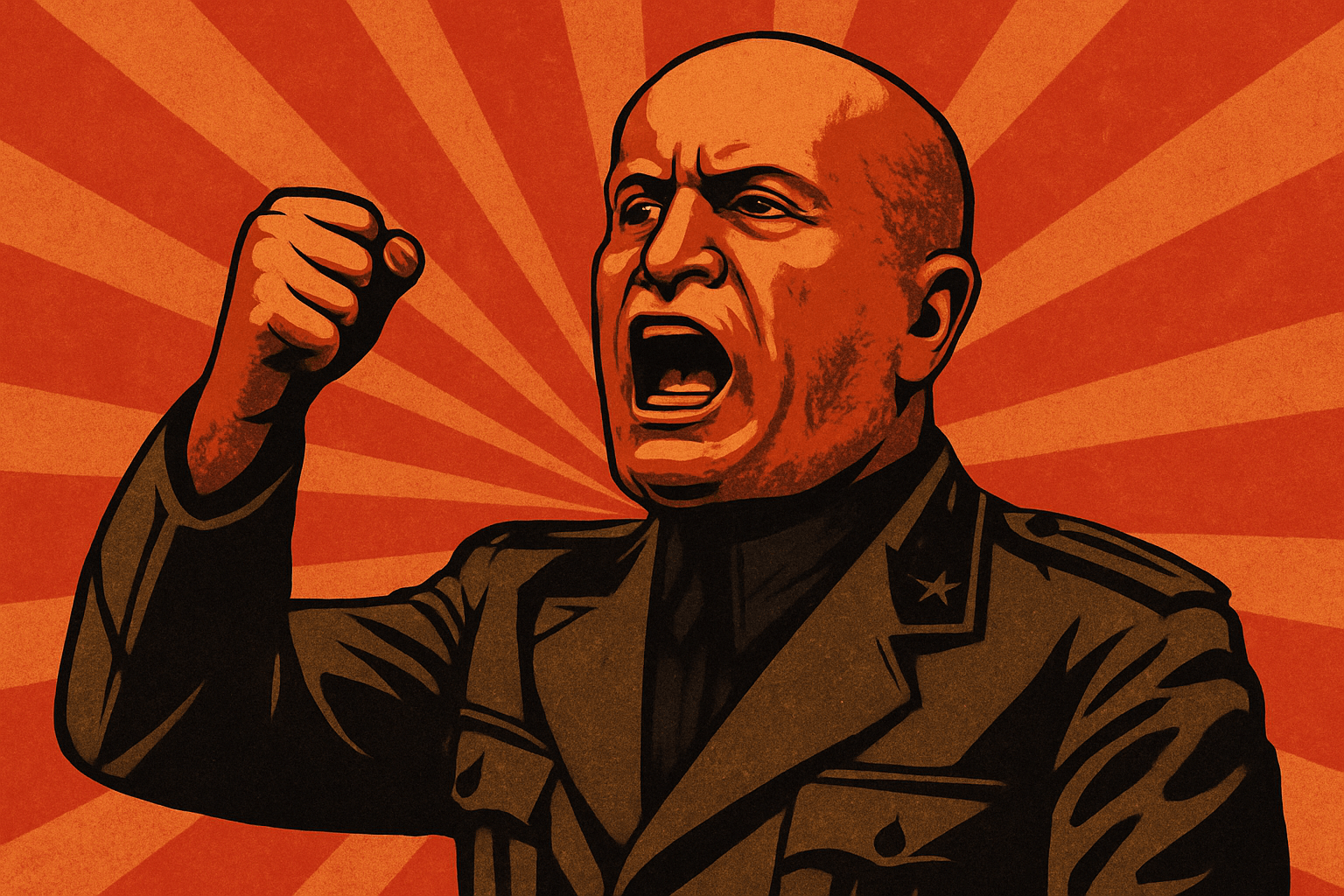Have You Even Read Mussolini, Bro?

Read Mussolini, To Understand Who Created Fascism
If you don’t know what fascism is, read Mussolini, the man who originally coined the term. The Doctrine of Fascism is a singular work, and though many others have embraced it and fought against it, that is the origin.
Using this term without reading Mussolini’s short work would be like talking about democracy without reading the Declaration of Independence or U.S. Constitution.
The World Forgets Mussolini As Fascism’s Creator
A lot of people in modern times treat political ideologies or systems as if they are somehow naturally occurring. Americans behave like democracy was invented, founded, and created in the United States. Students of history know Karl Marx created the work that became “Marxist” by followers of his work throughout history.
Mao even gets name recognition in an ideology.
Nazism is known to be Hitler’s. But too few people know who Benito Mussolini was, and the fact that this word which is thrown around so often “fascism” was something he created by word alone. It is understood by his deeds and how he, Hitler, and the Axis powers in WW2 conducted their war efforts.
But few people understand why there was once a clear distinction between those people and nations, and our own. Democracy may have a war policy and can certainly be abused, similarly to capitalist society. But, fundamentally, there is some acceptance of the Enlightenment Era Kantian concept of perpetual peace.
That’s one profound difference that used to exist.
It does not exist so much anymore, unfortunately.
For now…
It’s Simple: Fascism Is the Opposite of Perpetual Peace
If you think you know what fascism means, and you’ve never actually read Benito Mussolini’s writings…you’re just throwing the word around because it sounds intense. Read it. Try to at least.
It a rejection of Kant, basically, to the most extreme.
Immanuel Kant, a philosopher who lived in the Age of Enlightenment, came up with this dreamy idea that human reason and diplomacy could bring about a world of perpetual peace. This was a state where nations would resolve disputes peacefully, without resorting to war.
Sounds nice, right?
Not to Mussolini.
Benito Mussolini, Italian Journalist Turned Dictator
Mussolini was born in 1883, a hundred years after Kant, and by then, Europe had been through plenty of wars and revolutions that showed Kant’s idea of peace wasn’t exactly holding up. Mussolini rejected peace altogether. He believed that war was a necessary tool for the state to maintain strength and unity. Instead of seeking peace, he sought war. That’s the essence of fascism.
How that ultimately gets expressed may be a matter of personal taste or tactic. However, the state, to Mussolini, wasn’t there to keep the peace – it was there to enforce war policy. To make sure the nation stayed strong and powerful.
That’s fascism in a nutshell: war and conflict as the core of national identity.
It’s Simple, But Not That Simple
I’m not trying to oversimplify things, but fascism isn’t just about being mean or authoritarian – it’s about the philosophy of war as the preeminent state function. If you have heard the phrase that, “all war is an extension of state policy,” that phrase is often attributed to a Prussian General named Carl von Clausewitz.
In other words, state policy becomes militaristic at a certain point. It also means that violent policy will result in military conflict eventually. What Clausewitz meant is that war isn’t just a series of random, chaotic events – it’s a tool used by states to achieve their political objectives.
Diplomacy itself is another tool; that itself could be perceived as violent. That is why diplomatic communications are often very refined, simple, crafted, and somewhat open-ended. When it comes to peaceful resolutions of course.
And that’s essentially Mussolini’s view: the state should be involved in perpetual struggle, whether that’s on the battlefield or in the control of the people.
Fascism Is Inherently Neither Right-Wing Nor Left-Wing
It’s crucial to understand: this is a mentality, not just a political theory, and it doesn’t just exist on the extreme right. In fact, let’s take this one step further – because fascism can sneak into almost any political ideology.
The Perpetual War Mindset From Marx to Mussolini
Before you roll your eyes thinking this is just some “right-wing” thing, let’s talk about Marx.
Karl Marx is often seen as a champion of the working class. But Marx, just like Mussolini, rejected Kant’s notion of perpetual peace if you understand his beliefs. That does not mean he inherently is a fascist; however it is easy to take Marxist ideas and transform them for fascist purposes.
Marx believed that history is driven by class struggle – oppressor vs. oppressed – and that only through violent revolution could the working class overthrow the bourgeoisie and achieve equality. Sounds like an overhaul of the status quo, right? But here’s the twist: Marx, just like Mussolini, didn’t see peace as something that could be achieved naturally.
For Marx, it was revolution or bust – violent upheaval as the only way to bring about change.
Now, here’s where the connection to fascism gets interesting: Marxism, too, has been used as the foundation for authoritarian regimes – take the Soviet Union or Communist China, for instance.
Revolutionary ideals were used to justify authoritarian rule, and regimes that claimed to be working toward equality ended up implementing extreme state control and, in many cases, brutal repression of dissent.
The point is, fascism isn’t just a far-right thing – it can show up in leftist movements too. Whether you’re calling for the violent overthrow of a system, as Marx suggested, or the militarization of the state like Mussolini did, you’re both rejecting peace. Both ideologies were built on the idea that struggle and war were necessary for change.
And when you reject peace as an option, whether you’re Marxist, fascist, or anything in between, you’re heading down a dangerous road. It’s not about left vs. right – it’s about whether you see struggle and conflict as the only way forward.
Are You Rejecting Peace for Perpetual War?
Here’s where it gets real.
Fascism doesn’t always look like Mussolini’s Italy. It can look like your average politician – someone claiming to be a “peace president,” but in reality, they’re engaged in endless war, whether it’s actual conflict abroad or the culture wars here at home.
The thing is, if a leader or a government claims to want peace but is constantly creating division, war, or destruction, it’s fascism in disguise.
Mussolini wasn’t just some random dictator – his philosophy was about the rejection of peace in favor of power, struggle, and control. And guess what? That mentality can easily hide under the guise of any political philosophy – whether it’s nationalism, communism, or anything else.
Interpersonal Fascism Is Now An American Way of Life
People in families, communities, and political movements are so divided that we’ve lost sight of trying to understand one another. Instead, we’re at war with each other – whether through arguments, personal grudges, or global conflicts.
This perpetual war mindset is everywhere, even in spaces where peace could exist. It’s almost like we’ve forgotten how to talk things through – we’re more interested in winning than finding solutions. The value of real diplomacy and understanding is at an all-time low and that’s because there is too much fascism being implemented.
And when you do that, you’re operating in the same mental space that Mussolini described – where peace is a weakness, and conflict is the answer.
Reading Mussolini Is Hard…Because He Was A Terrible Writer
Before you go calling something or someone “fascist,” ask yourself – have you actually read Mussolini? If not, you might be missing a huge part of the conversation. The term “fascism” isn’t just a catchphrase; it’s a specific ideological framework that’s all about rejecting peace in favor of perpetual conflict. Mussolini’s work is a jumbled mess, by the way. If you ever try to read it and find yourself misunderstanding what he’s saying, it’s because a lot of times he’s just rambling.
Mussolini created a cult-like identity as some kind of world-changing philosopher. In reality he wrapped war up into some kind of life-altering good that Italy should revel in. A lot of his childhood of abuse and disdain for his father explains the psychological trauma which built the father of fascism.
Forget About Left & Right Wing Politics If You Want To Defeat Fascism’s Rise
It doesn’t matter if you’re left-wing, right-wing, or somewhere in between – fascism can sneak in anywhere. If you’re stuck in a mindset of perpetual struggle, whether that’s through ideology, politics, or personal relationships, you’re adopting the same mentality Mussolini championed.
So before you throw around terms like “fascist” or “peace president”, take a step back. Engage with the ideas. Think critically. Can you find a peaceful solution, or are you stuck in the cycle of war? Because if you can’t find peace, then you might be part of the problem – and that’s something Mussolini would’ve loved.
